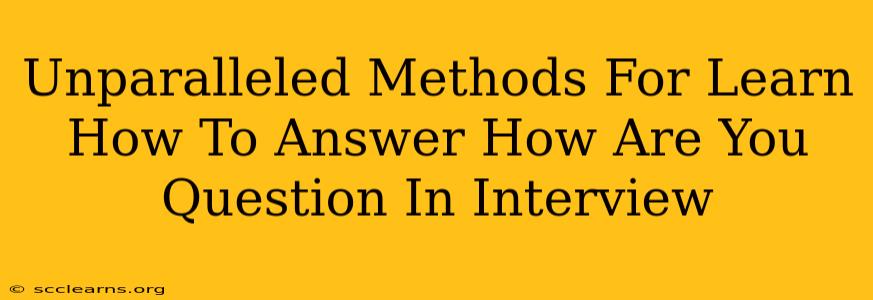The seemingly simple interview opener, "How are you?" often catches candidates off guard. While it might seem inconsequential, your response sets the tone for the entire conversation. A fumbled answer can undermine your professionalism and confidence before you even begin discussing your qualifications. This guide provides unparalleled methods for mastering this crucial introductory hurdle.
Beyond "Fine": Crafting the Perfect Response
The classic "Fine, thank you" is utterly unremarkable. It's safe, but it's also forgettable. Your goal is to make a positive impression and demonstrate your communication skills. Here's how to elevate your response:
1. The Enthusiastic Professional:
Instead of a flat "Fine," try:
- "I'm doing very well, thank you. I'm excited to be here today and learn more about this opportunity." This expresses enthusiasm and directly links your well-being to the interview.
- "I'm great, thanks! I'm really looking forward to discussing [mention something specific about the role or company that excites you]." This shows initiative and preparation.
Key takeaway: Inject positive energy and show genuine interest.
2. The Concise and Confident:
For a shorter, more impactful response:
- "I'm excellent, thank you. Ready to discuss my qualifications." This is direct, confident, and transitions seamlessly into the interview.
- *"Very well, thank you. And yourself?" This shows politeness and opens the door for a brief reciprocal exchange. Keep it brief though – don't get sidetracked into a lengthy personal conversation.
Key takeaway: Confidence and brevity are key.
3. The Strategic Bridge:
Use the question as an opportunity to subtly highlight a relevant skill:
- "I'm doing well, thank you. I've been busy preparing for this interview, and it's given me a chance to further refine my presentation skills." (If presentation skills are relevant to the role)
- "I'm fantastic! I recently completed a project that involved [relevant skill], and I'm eager to discuss how that experience aligns with this position." (If a specific project demonstrates a relevant skill)
Key takeaway: Connect your well-being to professional achievements.
What to Absolutely Avoid:
- Overly long or detailed answers: Keep it concise and professional.
- Complaining or negativity: No matter how you’re feeling, maintain a positive attitude.
- Rambling or irrelevant information: Stay focused on the interview context.
- Ignoring the question: Acknowledge the interviewer's courtesy.
Practice Makes Perfect: Role-Playing and Preparation
Rehearsing your response is crucial. Practice in front of a mirror, with a friend, or even record yourself. This will help you feel more confident and natural during the actual interview. Experiment with different approaches to find the one that feels most authentic to you.
Beyond the Initial Greeting: Maintaining a Positive Impression
Remember that answering "How are you?" is just the beginning. Your overall demeanor, body language, and engagement throughout the interview will have a significant impact. Maintaining eye contact, actively listening, and exhibiting enthusiasm will leave a lasting positive impression.
By mastering this seemingly minor aspect of the interview process, you'll demonstrate professionalism, confidence, and a keen understanding of communication – all essential qualities for success. Remember, it's about making a strong first impression and setting the stage for a productive and successful interview.

